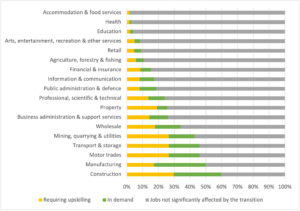How will Net Zero impact economic development in the UK? (Part 1)
Key messages:
Net Zero and the Green Economy
In 2019, the UK government declared an environment and climate emergency, committing to bring all greenhouse gas emissions to net zero by 2050 through various strategies such as the Ten Point Plan (2020), Energy White Paper (2020) and Net Zero Strategy (2021).
The shift to a ‘greener’ economy is now an inevitable transition, with low-carbon standards continually being embedded across all public and private sectors. The Net Zero Strategy identifies multiple areas of the economy in which decarbonisation should take place, which include reducing carbon outputs from infrastructure and energy production. Across national and local policy there is an increasing focus on the provision of greener buildings, and the acceleration towards greener modes of transport – including zero-emission vehicles, cycling and walking.
As we progress towards greener lifestyles and standards, the opportunity to further UK economic growth arises through capitalising on green technologies and services. The emerging area of the green economy has facilitated ambitions to mobilise public and private investments into green infrastructure and into supporting two million green jobs by 2030. This could provide significant benefits to economic and sustainable growth in the UK.
To understand the potential for future economic growth as the UK moves closer to net zero, we can consider the past performance of the UK economy alongside efforts made so far to reduce emissions. Figure 1 compares the change in Gross Domestic Product (GDP) and greenhouse gas (GHG) emissions of the UK and the rest of the G7 between 1990-2019. This suggests that GDP has continued to increase within G7 economies whilst emissions have fallen. It is also striking that the UK’s GDP growth has thus far kept pace with the rest of the G7, whilst simultaneously seeing a much greater reduction in emissions.
Figure 1: UK vs. rest of G7 – GDP and GHG emissions
Source: Net Zero Strategy: Build Back Greener, 2021 – from The World Bank UNFCCC National Inventory Submissions, ONS, BEIS Greenhouse Gas Inventory
What does net zero mean for sectors?
Decreasing emissions – whilst rehabilitating the economy following the impacts of Covid-19 – are key agendas for current UK strategies like the Ten Point Plan. The shift to a decarbonised economy is anticipated to positively contribute to the UK’s economic growth and is set to have wide implications on the levels and sectoral configurations of employment.
The term ‘green industry’ has various definitions – it may be industries with a low-carbon footprint (e.g., finance, education, scientific and technical activities), or industries that contribute to decarbonisation efforts (e.g., manufacturing of electric vehicles and renewables). Structural changes are predicted to emerge as employment opportunities develop in green industries, and in particular an increase towards research and development (R&D) is likely to occur. R&D will be driven by more investments into the innovation of greener, low-carbon technologies which not only address the goal of reaching net zero but also help to improve everyday amenities and services.
Conversely, occupations in high-carbon industries, such as fossil fuel energy production and mining, are expected to either adapt or decline. The labour market in these industries may need to transition towards sectors that suit their skillsets, or may require upskilling to work in green sector jobs.
Upskilling of the workforce in construction, manufacturing, motor trades, transport and storage, mining and quarrying, and utilities is predicted to be important to adapt to a greener economy and move away from a carbon-dependent society. As many as 25% of workers in these industries will require upskilling to gain the knowledge and skills to deal with new green sector jobs (e.g. renewable technologies and energy efficiency activities). Based on ONS data for Great Britain for 2023[1], this equates to approximately two million workers employed in mining and quarrying, manufacturing, construction, and repair of motor vehicles industries. This is a significant number, which will require skills training initiatives to match the scale of the opportunity.
Figure 2 shows how different sectors across the whole of the UK will be affected by the transition to a green economy.
Figure 2: Jobs requiring upskilling, existing jobs expected to be in high demand in a net zero economy, and jobs not significantly affected by the transition, by sector

Source: Place-based Climate Action Network
What does net zero mean for the UK geographically?
Whilst much discussion points to net zero being a positive contributor to the UK’s economic growth, less is said on the spatial implication of the transition . Given the rapid uptake of green economy initiatives, it is anticipated that geographical disparities will emerge, with some local areas benefitting from employment growth and others coming under economic pressure.
The South East’s relatively low level of high-carbon industries suggests the region stands to gain the most from the transition in terms of employment opportunities. The Levelling Up White Paper states that the largest (negative) socio-economic impact will be on areas outside the South East, particularly in the Midlands, the North, and Scotland, where one in every two jobs in these areas are in carbon-intensive industries, and therefore most susceptible to the negative impacts of the transition to net zero.
Nevertheless, with the right investment – particularly in skills and training – areas across the UK could benefit from the expected growth in renewables, electric vehicle manufacturing, hydrogen power, and carbon capture, utilisation and storage (along with the supply chain benefits associated with growth in these industries).
Conclusion
The green economy is set to reshape the structure of the UK socio-economic systems, impacting the UK’s geographies and sectors. There is the potential that such shifts will allow the opportunity to capitalise on growing green industries and the service sectors that are set to support them. Significant upskilling will also be required to support the employment transition away from high carbon-emitting industries, particularly in the Midlands, the North, and Scotland.
This insight piece has reflected how the transition towards a green economy will come hand in hand with economic development through increased employment in green sectors. In part 2 of this insight piece, we will consider some of the many other factors that will contribute to shaping a net zero UK economy – including changing modes of transport and changing demands and supplies of employment premises.
If you would like to talk to us more about this insight piece or related topics, please get in touch.
[1] ONS Business Register and Employment Survey

